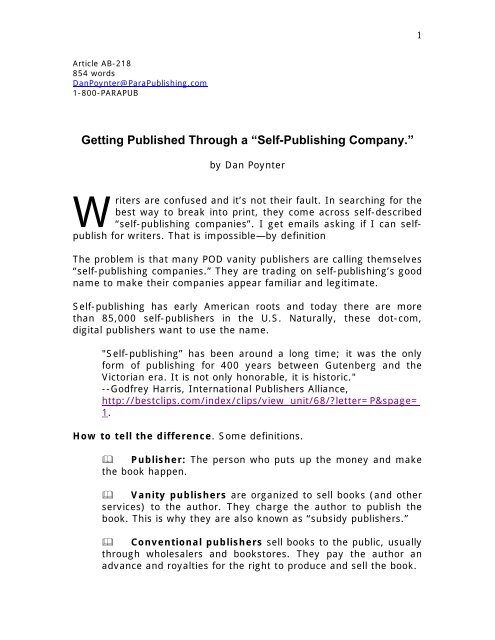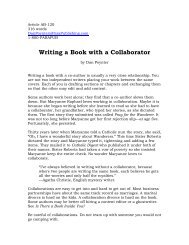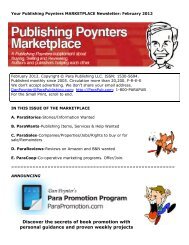Self-Publishing Company. - Para Publishing
Self-Publishing Company. - Para Publishing
Self-Publishing Company. - Para Publishing
You also want an ePaper? Increase the reach of your titles
YUMPU automatically turns print PDFs into web optimized ePapers that Google loves.
1Article AB-218854 wordsDanPoynter@<strong>Para</strong><strong>Publishing</strong>.com1-800-PARAPUBGetting Published Through a “<strong>Self</strong>-<strong>Publishing</strong> <strong>Company</strong>.”by Dan PoynterWriters are confused and it’s not their fault. In searching for thebest way to break into print, they come across self-described“self-publishing companies”. I get emails asking if I can selfpublishfor writers. That is impossible—by definitionThe problem is that many POD vanity publishers are calling themselves“self-publishing companies.” They are trading on self-publishing’s goodname to make their companies appear familiar and legitimate.<strong>Self</strong>-publishing has early American roots and today there are morethan 85,000 self-publishers in the U.S. Naturally, these dot-com,digital publishers want to use the name."<strong>Self</strong>-publishing” has been around a long time; it was the onlyform of publishing for 400 years between Gutenberg and theVictorian era. It is not only honorable, it is historic."--Godfrey Harris, International Publishers Alliance,http://bestclips.com/index/clips/view_unit/68/?letter=P&spage=1.How to tell the difference. Some definitions. Publisher: The person who puts up the money and makethe book happen. Vanity publishers are organized to sell books (and otherservices) to the author. They charge the author to publish thebook. This is why they are also known as “subsidy publishers.” Conventional publishers sell books to the public, usuallythrough wholesalers and bookstores. They pay the author anadvance and royalties for the right to produce and sell the book.
2Would you write a book knowing that you would be the onlypurchaser?How to spot scam vanity publishers. A literary attorney advisesother lawyers. seehttp://www.wisbar.org/AM/Template.cfm?Section=Wisconsin_Lawyer&template=/CM/ContentDisplay.cfm&contentid=68934According to Wikipedia, <strong>Self</strong>-<strong>Publishing</strong> is the publishing of books andother media by the authors of those works, rather than by established,third-party publishers.The only “self-publishing company” is you—bydefinition. If you pay a publisher, your book is not SELF-published.<strong>Self</strong>-publishers, write, publish and promote their own books. We havebeen building name recognition for self-publishing for more than 35years.<strong>Self</strong>-publishing garners respect. Traditionally,when a book publishing CEO wrote a memoir, heor she would seek another publisher to release itso that the book would not appear to be a vanitywork.Times have changed. <strong>Self</strong>-publishing has becomeso recognized and legitimate that the vanitystigma from publishing your own Work has nearlydisappeared.Now that people know what self-publishing is, we find we have to reeducatethe public to the fact that we are the real self-publishers andthe other DotCom POD digital publishers are really just vanitypublishers masquerading as us. They are trading on the goodreputation we have built.On the other hand, there are many digital printing companies. Mostprovide excellent prices, service and quality. They should refer tothemselves as “book printers.”For information on the choices for breaking into print, get the f-r-e-eInformation Kit #2 on <strong>Publishing</strong> athttp://parapublishing.com/sites/para/resources/infokit.cfmMany of the DotCom vanity publishers help people to produce theirbooks for a few hundred dollars. The low cost of entry attracts literarytalent from the bottom of the barrel. With so little to invest, most of
3these authors don’t verify their research and don’t invest in editors,typesetters, book designers or cover artists. Both authors andpublishers of these poor-quality vanity-published books give all bookpublishing a bad name.These POD vanity publishers are leaving a trial of unhappy customers.See the list of unresolved complaints to the Better Business Bureau.http://poddymouth.wordpress.com/2008/01/18/self-publishing-podindustry-reputations/Should you self-publish? For a self-paced quiz,see http://www.happilypublished.com/self.html.Does self-publishing work? It worked for JohnGrisham, Richard Nixon and Stephen King. SeeDocument 155 athttp://parapub.com/sites/para/resources/allproducts.cfmand seehttp://parapub.com/sites/para/resources/success_list.cfm<strong>Self</strong>-<strong>Publishing</strong> and the Long Tail. Seehttp://www.bob-baker.com/qt/abundance.htmlDue diligence. Writing a book is a creative act; publishing a book is abusiness. Before trying anything new, people should get educated.“Buying a few books and attending some seminars are cheaperthan a mistake.”-- Mindy Bingham, publisher, Academic Innovations, SantaBarbara.Anyone who's been in publishing for a while can share a number ofstories of people who stumbled and blundered into the book gamewithout getting sufficient information first. These pioneers have madejust about every mistake imaginable. Profit from their (temporary)failures: don’t repeat their painful lessons.“It's unfortunate when someone makes a mistake but it'sunforgivable when an error is made a second time.”-- Dan PoynterRemember that in any new field, especially book writing andpublishing, others have blazed the trail for you.
4The book industry is full of helpful and supportive people. It may beunexpected because this kind of camaraderie does not exist in otherindustries. The reason that book people are so helpful, friendly andsupportive is that every book is unique. There is little to nocompetition in book publishing. When it comes to marketing books, weare conspirators not competitors.Let’s respect historical and common definitions. We can protect thenewcomers to book publishing by helping them to understand thedifference between conventional publishers, self-publishers, bookprinters and the vanity/subsidy publishers.~~~~~~~~~~~~~~~~~~~~~~~~~~~~~~~~~~~~~~~~~Dan Poynter, author of The <strong>Self</strong>-<strong>Publishing</strong> Manual, is the “Godfather”to thousands of books. He has written more than 100 books since1969. Dan is a past vice-president of the Publishers MarketingAssociation. For more information on book publishing and promoting,see http://<strong>Para</strong>Pub.com.© 2008-30-
















